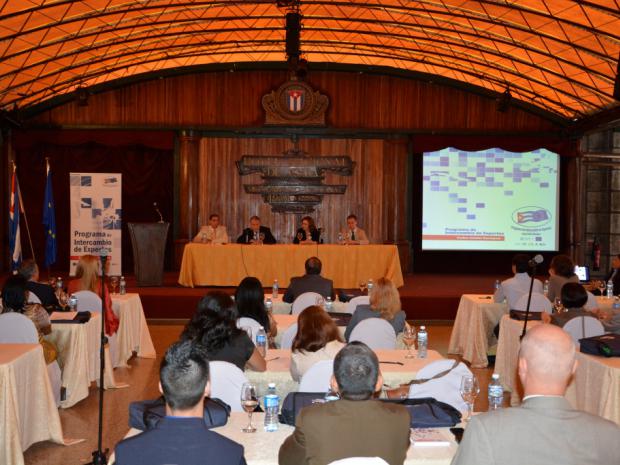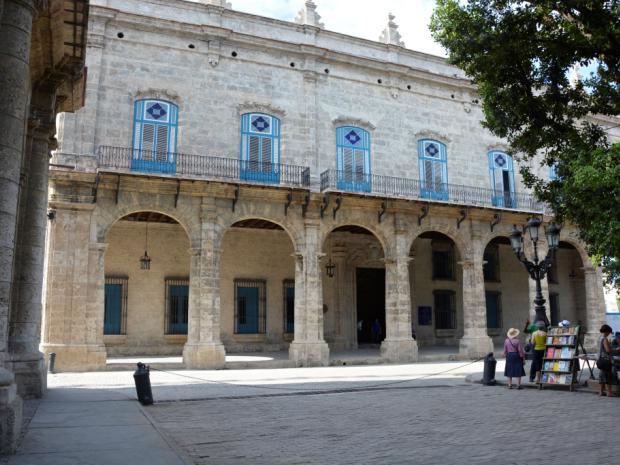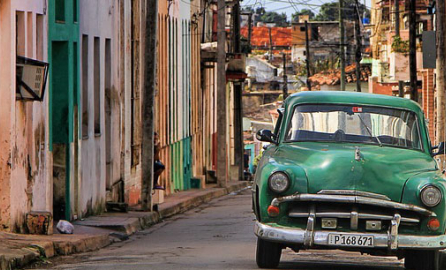Herman Portocarero became the EU's first fully-fledged ambassador to Cuba in July 2012. In Havana he oversees development cooperation as well as political, trade and investment links. He spoke to Capacity4dev shortly before the EU and Cuba signed a Political Dialogue and Cooperation Agreement, a new legal framework which aims to support the transition process of the Cuban economy and society.
| Herman Portocarero joined the Belgian diplomatic service in 1978 after practicing law in Antwerp. He was posted to Ethiopia in 1979, Jamaica in 1982 and Cuba in 1995. In the intervening years he took up UN diplomacy, and later became UN Ambassador to the Caribbean region. He joined the newly-created European External Action Service in 2012 as EU Ambassador to Cuba. |
Capacity4dev (C4D): What are the EU’s main areas of development cooperation in Cuba?
Herman Portocarero (HP): The EU and Cuba face some of the same challenges. Cuba has an aging population, long life expectancy, a low birth rate, and consequently very expensive social security. More and more people are retired; fewer and fewer people are in active life. Those are challenges that we in Europe share, and it is for that reason we have been working under the slogan “desafíos comunes – shared challenges”.
My other priority would be to define a viable public sector as soon as possible. The public sector still dominates the economy, and I don’t think that’s sustainable in the long run. But on the other hand, we don’t want to privatise everything. So I think we should help our Cuban friends to define where they can keep a viable public sector, as opposed to giving everything to the private sector.
C4D: What are the main challenges for cooperation, and are there any particular projects that stand out?

Exchange of Experts Programme
HP: I think what’s been the most difficult is to be allowed to work with and within Cuban administrations, because they’re rather secretive for all kinds of reasons – mistrust, inward-looking. I think one of the main gains we’ve had is through a programme called Exchange of Experts, where we have been able to work in line ministries on very specific issues such as statistics and setting up a tax system, which are essential to reform the economy. And we’ve been able to do that from within line ministries, which is a bit of a victory in the Cuban context, with very little money.
We spend a lot more money on more visible things, such as agriculture, and we’re now moving into renewable energies. But I think for the long run, the most productive programme we’ve had is the least expensive one – an exchange of experts to bring the Cuban administration, which is very competent but comes from very far, up to date with the new economic reality. I think that’s what I consider our success story. Other sectors are still much more complicated.
C4D: Which industries are you particularly helping to develop?
HP: We are hoping to work mostly in the pharmaceuticals and biotech sectors, because they are very promising in Cuba. It’s not propaganda; they have very high-quality products, but those are very controlled markets, and entering those markets is difficult. They have gained access with some of their pharmaceutical products in big markets: Russia, India, Brazil, China. But we should help them. We are starting with the essentials: homologation, labelling, all those things, and we’re giving them technical assistance on that too.
C4D: Cuba has a reputation for being shut off from the world – yet at the same time, it fascinates the rest of the world and is full of embassies. Can you explain this?
HP: Well, Cuba always had a certain appeal. It’s a strong brand. That doesn’t sound very respectful, but it’s true - Cuba is a name. It attracts. It’s also a regional player and a player in the United Nations way above its objective weight. Cuba also lobbies to have as many embassies there as possible, because it was always a point of proof towards the United States. When the US said, “You’re isolated”, they said, “That’s not true; everybody’s here. There are more than 100 embassies here.” So it’s a mixture of reasons. But first and foremost, I think it’s still the political appeal of Cuba. Whether you like it or not, they put themselves on the world map, and they are still very much there.
C4D: What will be the significance of the Political Dialogue and Cooperation Agreement between Cuba and the EU, signed in December 2016?
HP: It will mean that for the first time there will be a solid legal base for the relationship. Previously it was rather ad hoc. Cuba was one of the only countries in the region that didn’t have that kind of structured relationship. It means we are opening more channels for communication, not just to talk about cooperation, but also to talk about political issues, about human rights, about civil society. So it’s much more forward-looking and less specific than what we had till now.
C4D: Will Cuba’s opening up with the US have an impact on your development work?

Palacio del Segundo Cabo: Interpretation Centre on the Cultural Relations between Cuba and Europe
HP: Undoubtedly, and in many ways. The US was negotiating their new policy while we were negotiating our agreement, although we didn’t know that. We come from very different starting points. The US has half a century of political fighting with Cuba behind them. We don’t - the EU has had more than 25 years of diplomatic relations, and all of the Member States now have fully-fledged diplomatic relations. So we don’t start from as far back as the Americans do. We have a much more thorough knowledge of Cuban society. We have been talking to the Cubans for longer – and not about the Cubans, because that’s always my point: Don’t talk about Cuba, talk with Cuba.
We share values with the US in the human rights field regarding civil society, but we have different agendas sometimes. We want the Cuban economy to be a mixed economy with a viable public sector. The US tendency is to put more emphasis on private initiatives. We are much more concerned about the social future than our American friends, although we shouldn’t see that in black and white – the American left also has concerns about social problems. But we come from a much more social background in the EU, and we think and hope that the European model, however much stress it is under itself, is still a viable model for the future. So we are to some extent mutually reinforcing with the US and sometimes we are not. Of course in the economy, including in investment for tourism, we will be competitors.
C4D: What impact will Cuba’s emergence have on the surrounding region?
C4D: What are some of the climate change projects you’re working on?
HP: It’s mostly the effects of climate change on agriculture: soil salination and the rise in sea level. A lot remains to be done. We are working very actively with the Cuban Ministry of the Environment. But it’s been a little slow. I think, in the five-year cycle we’re in now, we should be more advanced, especially in those fields.
C4D: What’s holding back progress?
HP: To be entirely frank, bureaucracy. The fact that all our cooperation has to go through various ministries. For every project, terms of reference have to be agreed, and then it all has to become part of the national planning, because it’s a totally planned economy. So we already have these two series of procedures we have to go through with Cuba. Then of course anything that requires contracting or public markets or tendering is very special, because you don’t have an open market in Cuba. Often we have to tender outside. We also work mostly through UN agencies or NGOs, which adds levels of administration. So it’s a number of factors, and you get delays. Then there are delays in deliveries in the port; we have big delays just for customs or other reasons. And there’s a lack of capacity in the ports.
C4D: How does a project go from first idea to implementation?

AGROCADENAS: Support to the strengthening of agricultural value chains at local level
HP: The first stage and the first hurdles are mostly when you define the terms of reference, because that is politically sensitive in Cuba, and you have to know the vocabulary. That is changing now, but four years ago, whenever you said “private sector” or “management training” or whatever – there were taboo words. Luckily that’s improving. Then you have to agree on the funds you want to have available. We mostly try to have larger projects for management reasons. If we end up with 25 different contracts, it’s much more difficult for our DEVCO people to manage. So we try to do larger things as opposed to smaller things. Then we have to find the beneficiaries in Cuba, where we try to shift things away from the pure state beneficiary and more to the cooperative sector, which is the option we have now because the private sector is still very weak. So we try to promote basically cooperative models right now. Then, when we have all that agreed, we have to fit it into the national planning, and when that is ready we find who is going to be implementing in the field, which in most cases will be UNDP (the United Nations Development Programme). For smaller projects, it might be European-based NGOs that have the legal status to work in Cuba. It’s cumbersome.
C4D: Do you think Cuba is ready for the influx of tourists, and how can it be harnessed to help the poorest parts of the population?
HP: The Cuban population think they are ready because many Cubans have family members in the US, and they think they know the United States. I don’t think the country is ready for the kind of competitive economy that the West would bring. There will be winners and losers, like there have been in any country that went through these changes.
Further Reading
Find out more about how the EU works with Cuba by visiting the EU Delegation's website.


Log in with your EU Login account to post or comment on the platform.